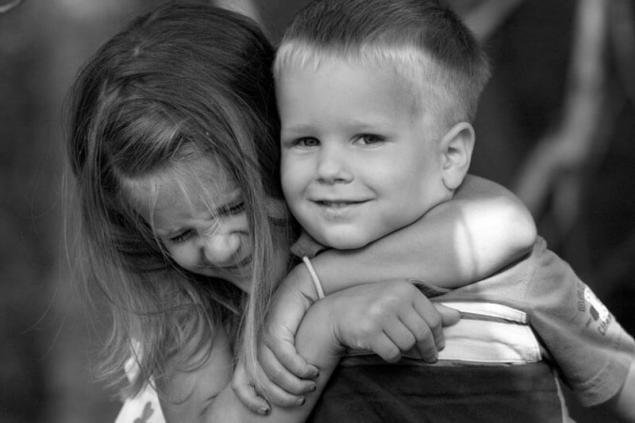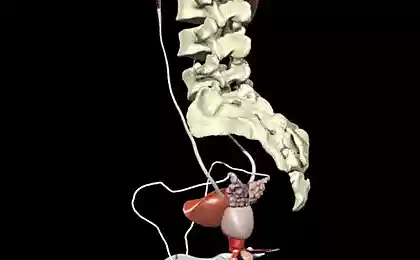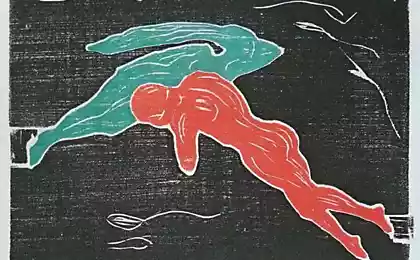515
Love does not impose obligations
In emotions there are two main sources: the fear (and all the feelings generated by them), and love (and all feelings based on it).
We experience both, but in daily life most people have a predominant fear. We can say that the ordinary to our world of relations between people 95% consist of fear, and only 5% — out of love. Of course, in different cases this ratio has changed, but even 60% fear 40% love is still the predominance of fear.
In order to understand these feelings, you need to determine some of the characteristics of love and fear, which I call the "Path of love" and "Path of fear". These two ways — only a starting point to help you understand what the basis of our life. This separation is introduced using the logical mind to make it easier to understand what is happening and to get some control over the decisions which we make decisions.

What are their characteristics?
1. Love does not impose obligations. Fear is a solid commitment.
By following the path of fear, we do one or the other, because I have; we also expect them to do so-and-so, because you have to. We have obligations, but as soon as there is something that we should do, we immediately begin to resist. And the stronger this resistance, the more we suffer. Sooner or later, we have a desire to avoid these obligations. Love, by contrast, does not oppose anything. Whatever we do, we do it just because they want to. Everything becomes a pleasure — a kind of game, it brings joy.
2. Love expects nothing. Fear is full of expectations.
In fear we do this or that, because I think if obliged to do so, and from others I expect the same. That is why fear hurts, and love.
We're on to something we expect, but if it doesn't happen, we hurt, we consider it an injustice. We blame others that they do not meet our expectations. However, when you love someone, don't expect anything: we love because we want it, and if other people do something or don't, also just because you want or not want, and there's nothing personal.
If you do not hope for something that doesn't happen, so what's the problem? We do not have any uncomfortable feelings that no matter what happens, everything will fit. That's why lovers almost nothing hurts; they just don't demand anything from the beloved, do not bind each other to any obligation.
3. Love is based on respect. Fear doesn't respect anything, including fear itself.
If I pity someone, it means I don't respect him. He can't make decisions? But if I have to make decisions for someone else, then I show him disrespect. And if I do not respect someone, then you try that person to manage.
In most cases, when we tolkovye children how to live, we show disrespect to them. We are sorry for them and try to do for them what they should do for themselves. But if I do not respect yourself, you begin to feel sorry for yourself. I think I'm not good enough to live in this world. How to determine what show no respect for yourself? Thoughts: "Ah I poor thing! I don't have the skills, I'm too stupid I was too ugly so I turned..." self — Pity is a consequence of disrespect.
4. Love is ruthless: she doesn't have anyone pity, but she has compassion. Fear is full of pity, he pities all.
We are sorry for those who don't have respect, because I do not believe that these people are strong enough to something to cope. And love respects the other. If we love a person, then believe that he will do it. We know he's strong enough, smart and good to implement their intentions. We don't have to decide anything for him. He can handle himself. If that doesn't work, we extend his hand, help to stand up and say: "You can! Try it!" This is compassion, but not pity. Compassion is the consequence of respect and love, and pity is a manifestation of disrespect and the result of fear.
5. Love without hesitation accepts responsibility. Fear avoids responsibility, but this does not mean that he would not respond.
Attempts to avoid responsibility is one of the most serious of our mistakes, because every act has consequences. Everything we do and think has consequences.
When we make choices, we are waiting for the result, some reaction. But the result and the consequences are sure to arise and in that case, if we do not make a choice. And the action and inaction have consequences.
That's why each person is fully responsible for their actions. Even if you don't want to! Yes, sometimes our missteps are trying to fix other people, but we still have to pay for mistakes — and in the end paying twice. When someone else tries to take responsibility for us, it only leads to even more serious troubles.
6. Love is always good. Fear kindness not typical.
On the path of fear we have a lot of responsibilities and expectations. In this way we don't have respect, avoid responsibility and feel shame. But how good feelings can arise from someone who suffers from a persistent fear? We feel a victim of all around, we are constantly angry and sad, we feel jealous and think that we are betrayed.
Anger is nothing like the mask of fear. Sadness is fear in disguise. Jealousy is the fear under the mask. Experiencing these feelings are based on fear and causes pain, we can only pretend to be good. In fact, we are not good, because feel bad, do not feel happiness.
But when you walk the path of love, you have no obligations, no expectations. You do not spare either himself or his companion. All is well as it is — and because the face is consistently your shining smile. You're happy, and that happiness makes you kind. Love is always kind, and kindness makes us generous and gives us all the doors. Love is generous. Fear greedy: he wants only for himself. Selfishness locks any door.
7. Love is unconditional. Fear always imposes conditions.
On the path of fear we love a person, when he lets himself get pushed around, if he's good to us if it corresponds to the image that we have. We come up with what should be around, but other people are not, and never such will not, and we condemn them for it, got them a guilty verdict. We are ashamed for the person, if it is not what we would like it to be. When it does not fit in our own way, we are confused, annoyed, exasperated. But this is only a feigned love.
On the path of love is not "if", there are no conditions. We love the person the way he is, and we have the right to be yourself. And if we don't like what he is, better to just find someone else — someone like us more. We have no right to change anyone, and nobody has the right to try to change us. If we're to change, then only in that case we do want it — for example, when you intend to stop the former suffering.
Most people their whole life are on the path of fear. They have a relationship, because I feel like obligated to do so. Within this relationship they connect with the spouse and with themselves many expectations.
All the drama and suffering caused by the fact that we use those channels of communication that existed long before our birth. People blame others and become victims themselves, they're gossiping with friends and about friends, at home and at the bar. They awaken the family members hate each other. They accumulate emotional poison and pass it on to their children. "Look at his dad! Look what he did! I hope you will grow like him. All men are bastards! All women are bitches!" That's what we do with the people you love are with your children, friends and companions of life.
On the path of fear we come up with so many conditions, expectations and obligations, which in the end create a rule — only in order to protect themselves from emotional suffering.
Actually, no there should be no rules. However, these rules have an impact on the number of channels of communication between us, because when people are scared, they start to lie. If we hope that people have to be so-and-so, he feels obliged to be such. The trouble is that he does not like to see him. When he is honest to us and remains so, which is, it touches us, brings to rabies. Because he's lying to us — because he is afraid of our conviction. He is afraid that we will start in something to accuse, prosecute and punish. And whenever I think back about some of his actions, we punish them again and again — many times for the same error.
In the way of love of justice. If the person made a mistake, he pays for only one time. And if he truly loves himself, will take away from this error, a lesson. On the way fear there is no justice. We behave so that we pay for the same mistake thousands of times. And your life partner, your friends we force to pay for the same mistake repeatedly. This causes a feeling of injustice and causes more and more emotional wounds. Of course, we just tune in to the defeat.
People manage to make drama out of anything, even of the most simple and insignificant events. And we see that all these drama is a natural form of relationship in hell, because almost all couples are on the path of fear.published
© Miguel Ruiz, "The Mastery Of Love"
P. S. And remember, just changing your mind — together we change the world! ©
Join us in Facebook , Vkontakte, Odnoklassniki
Source: www.facebook.com/tobewoman/posts/934657896610441
We experience both, but in daily life most people have a predominant fear. We can say that the ordinary to our world of relations between people 95% consist of fear, and only 5% — out of love. Of course, in different cases this ratio has changed, but even 60% fear 40% love is still the predominance of fear.
In order to understand these feelings, you need to determine some of the characteristics of love and fear, which I call the "Path of love" and "Path of fear". These two ways — only a starting point to help you understand what the basis of our life. This separation is introduced using the logical mind to make it easier to understand what is happening and to get some control over the decisions which we make decisions.

What are their characteristics?
1. Love does not impose obligations. Fear is a solid commitment.
By following the path of fear, we do one or the other, because I have; we also expect them to do so-and-so, because you have to. We have obligations, but as soon as there is something that we should do, we immediately begin to resist. And the stronger this resistance, the more we suffer. Sooner or later, we have a desire to avoid these obligations. Love, by contrast, does not oppose anything. Whatever we do, we do it just because they want to. Everything becomes a pleasure — a kind of game, it brings joy.
2. Love expects nothing. Fear is full of expectations.
In fear we do this or that, because I think if obliged to do so, and from others I expect the same. That is why fear hurts, and love.
We're on to something we expect, but if it doesn't happen, we hurt, we consider it an injustice. We blame others that they do not meet our expectations. However, when you love someone, don't expect anything: we love because we want it, and if other people do something or don't, also just because you want or not want, and there's nothing personal.
If you do not hope for something that doesn't happen, so what's the problem? We do not have any uncomfortable feelings that no matter what happens, everything will fit. That's why lovers almost nothing hurts; they just don't demand anything from the beloved, do not bind each other to any obligation.
3. Love is based on respect. Fear doesn't respect anything, including fear itself.
If I pity someone, it means I don't respect him. He can't make decisions? But if I have to make decisions for someone else, then I show him disrespect. And if I do not respect someone, then you try that person to manage.
In most cases, when we tolkovye children how to live, we show disrespect to them. We are sorry for them and try to do for them what they should do for themselves. But if I do not respect yourself, you begin to feel sorry for yourself. I think I'm not good enough to live in this world. How to determine what show no respect for yourself? Thoughts: "Ah I poor thing! I don't have the skills, I'm too stupid I was too ugly so I turned..." self — Pity is a consequence of disrespect.
4. Love is ruthless: she doesn't have anyone pity, but she has compassion. Fear is full of pity, he pities all.
We are sorry for those who don't have respect, because I do not believe that these people are strong enough to something to cope. And love respects the other. If we love a person, then believe that he will do it. We know he's strong enough, smart and good to implement their intentions. We don't have to decide anything for him. He can handle himself. If that doesn't work, we extend his hand, help to stand up and say: "You can! Try it!" This is compassion, but not pity. Compassion is the consequence of respect and love, and pity is a manifestation of disrespect and the result of fear.
5. Love without hesitation accepts responsibility. Fear avoids responsibility, but this does not mean that he would not respond.
Attempts to avoid responsibility is one of the most serious of our mistakes, because every act has consequences. Everything we do and think has consequences.
When we make choices, we are waiting for the result, some reaction. But the result and the consequences are sure to arise and in that case, if we do not make a choice. And the action and inaction have consequences.
That's why each person is fully responsible for their actions. Even if you don't want to! Yes, sometimes our missteps are trying to fix other people, but we still have to pay for mistakes — and in the end paying twice. When someone else tries to take responsibility for us, it only leads to even more serious troubles.
6. Love is always good. Fear kindness not typical.
On the path of fear we have a lot of responsibilities and expectations. In this way we don't have respect, avoid responsibility and feel shame. But how good feelings can arise from someone who suffers from a persistent fear? We feel a victim of all around, we are constantly angry and sad, we feel jealous and think that we are betrayed.
Anger is nothing like the mask of fear. Sadness is fear in disguise. Jealousy is the fear under the mask. Experiencing these feelings are based on fear and causes pain, we can only pretend to be good. In fact, we are not good, because feel bad, do not feel happiness.
But when you walk the path of love, you have no obligations, no expectations. You do not spare either himself or his companion. All is well as it is — and because the face is consistently your shining smile. You're happy, and that happiness makes you kind. Love is always kind, and kindness makes us generous and gives us all the doors. Love is generous. Fear greedy: he wants only for himself. Selfishness locks any door.
7. Love is unconditional. Fear always imposes conditions.
On the path of fear we love a person, when he lets himself get pushed around, if he's good to us if it corresponds to the image that we have. We come up with what should be around, but other people are not, and never such will not, and we condemn them for it, got them a guilty verdict. We are ashamed for the person, if it is not what we would like it to be. When it does not fit in our own way, we are confused, annoyed, exasperated. But this is only a feigned love.
On the path of love is not "if", there are no conditions. We love the person the way he is, and we have the right to be yourself. And if we don't like what he is, better to just find someone else — someone like us more. We have no right to change anyone, and nobody has the right to try to change us. If we're to change, then only in that case we do want it — for example, when you intend to stop the former suffering.
Most people their whole life are on the path of fear. They have a relationship, because I feel like obligated to do so. Within this relationship they connect with the spouse and with themselves many expectations.
All the drama and suffering caused by the fact that we use those channels of communication that existed long before our birth. People blame others and become victims themselves, they're gossiping with friends and about friends, at home and at the bar. They awaken the family members hate each other. They accumulate emotional poison and pass it on to their children. "Look at his dad! Look what he did! I hope you will grow like him. All men are bastards! All women are bitches!" That's what we do with the people you love are with your children, friends and companions of life.
On the path of fear we come up with so many conditions, expectations and obligations, which in the end create a rule — only in order to protect themselves from emotional suffering.
Actually, no there should be no rules. However, these rules have an impact on the number of channels of communication between us, because when people are scared, they start to lie. If we hope that people have to be so-and-so, he feels obliged to be such. The trouble is that he does not like to see him. When he is honest to us and remains so, which is, it touches us, brings to rabies. Because he's lying to us — because he is afraid of our conviction. He is afraid that we will start in something to accuse, prosecute and punish. And whenever I think back about some of his actions, we punish them again and again — many times for the same error.
In the way of love of justice. If the person made a mistake, he pays for only one time. And if he truly loves himself, will take away from this error, a lesson. On the way fear there is no justice. We behave so that we pay for the same mistake thousands of times. And your life partner, your friends we force to pay for the same mistake repeatedly. This causes a feeling of injustice and causes more and more emotional wounds. Of course, we just tune in to the defeat.
People manage to make drama out of anything, even of the most simple and insignificant events. And we see that all these drama is a natural form of relationship in hell, because almost all couples are on the path of fear.published
© Miguel Ruiz, "The Mastery Of Love"
P. S. And remember, just changing your mind — together we change the world! ©
Join us in Facebook , Vkontakte, Odnoklassniki
Source: www.facebook.com/tobewoman/posts/934657896610441























